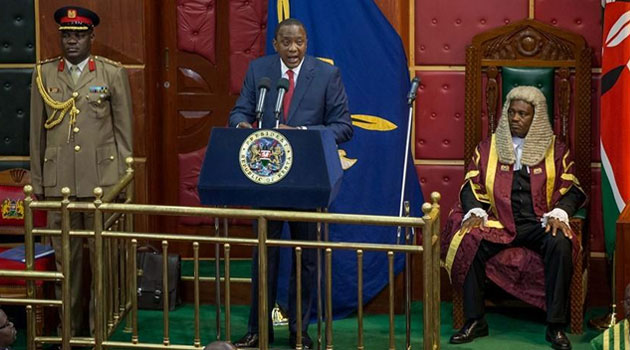
He also announced the setting up of a Sh10 billion restorative justice fund, again in accordance with the TJRC’s recommendations, over the next three years; a day after receiving a report on the 2008 post-election violence from the Director of Public Prosecutions (DPP).
NAIROBI, Kenya, Mar 26 – President Uhuru Kenyatta, in keeping with the recommendation of the now defunct Truth, Justice and Reconciliation Commission, has apologised for the atrocities that were committed to Kenyans under previous governments.
President Kenyatta proffered an apology for the 2008 post-election violence, the Wagalla massacre, the Nyayo House torture chambers and for the unresolved murders of such historical greats as Tom Mboya to applause in Parliament during his State of the Nation address on Thursday.
“To this day, we are still plagued by all actions that have at times failed to recognise the civil and human rights of Kenya’s citizens. These have shaken the nation, excluded some Kenyans from the full promise of citizenship, and fractured our national fabric,” he said.
He also announced the setting up of a Sh10 billion restorative justice fund, again in accordance with the TJRC’s recommendations, over the next three years; a day after receiving a report on the 2008 post-election violence from the Director of Public Prosecutions (DPP).
“In many ways, Kenyans and humanity overall, have benefited from restorative justice, an approach that is deeply rooted in our cultural and historical realities, particularly when such conflicts have a communal and political dimension. My administration was forged from this reconciliation,” he submitted.
And in light of the DPP’s assessment that the majority of the post-election violence cases cannot be successfully prosecuted, President Kenyatta said the fund would act as reparation.
“There are challenges to obtaining successful prosecutions. These challenges range from inadequate evidence, inability to identity perpetrators, witnesses fear of reprisals, and the general lack of technical and forensic capacity at the time. Nonetheless, the DPP recommends that these cases be dealt with using restorative approaches,” President Kenyatta explained.
As for the rest of the TJRC report, President Kenyatta called on Parliament to “process it without undue delay.”
President Kenyatta and Parliament had come under criticism from a section of the civil society for taking their time to implement the findings of the TJRC.
“Although Parliament amended the law to give themselves power to have the report tabled for consideration, there are certain things within the original Act that remain unchanged. One, is the timeline of six months. So the question to be asked is, one year down the line, how come that timeline has not been obeyed?” human rights Lawyer Njonjo Mue posed to Capital FM News a year after the report’s release in May of 2013.
READ: Civil Society ignites debate on TJRC report
The embattled chair of the now defunct Commission, Bethuel Kiplagat, however told Capital FM News that despite the delay, he was beside himself that the Head of State had actually read their report.
He also welcomed the apology on behalf of past and the present government as well as the setting up of a reparations fund.
“The President has set the tone. Now let the individuals who visited terror upon their neighbours follow suit. That is the only way we can truly heal and stop constantly looking back as a nation,” he said.
Again in keeping with the TJRC’s recommendations, President Kenyatta said that he had set up a, “a state department dedicated to strategic initiatives in marginalised and at-risk regions and populations of our country.”









































